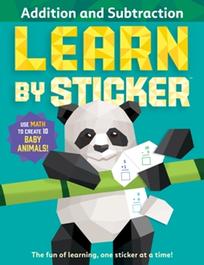 Alisha Zucker, a former New York City third-grade teacher and curriculum writer, serves as senior editor on the educational resources team at Workman Kids. She oversaw the revision of the Brain Quest 30th Anniversary workbooks, and has developed two new series, Learn by Sticker and Learn to Write.
Alisha Zucker, a former New York City third-grade teacher and curriculum writer, serves as senior editor on the educational resources team at Workman Kids. She oversaw the revision of the Brain Quest 30th Anniversary workbooks, and has developed two new series, Learn by Sticker and Learn to Write.
Karen Edwards has written and developed materials for educators and students, and joined Workman Kids in 2018 as editorial director of educational resources to develop innovative material for Brain Quest and The Big Fat Notebooks.
Here, Edwards and Zucker give Shelf readers a peek into the long-lasting Brain Quest brand, and how they create educational content that is appreciated by teachers and caretakers alike.
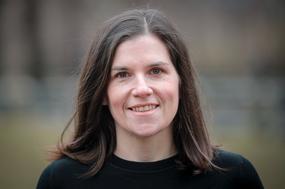
|
|
| Alisha Zucker (photo: Brendan McDermid/Reuters) | |
Alisha Zucker: I was a Brain Quest Kid! My family used to drive to Florida every year from Ohio--that's an 18-hour drive--and my sister and I would play Brain Quest for a lot of it.
Karen, you just oversaw a complete revamp of Brain Quest for our 30th anniversary so I wanted to ask: What was important for you to preserve from the original Brain Quest? And what did you want to get into the new version?
Karen Edwards: I'm so glad that I have a Brain Quest kid working on the brand. We have several Brain Quest kids on our team, and they have similar back-seat quiz session stories too!
Brain Quest has a history and tradition of celebrating learning that we wanted to preserve. We also wanted to preserve the academic rigor, accessibility, and relatability of content. It was important to us that today's kids connect with the books and smart cards in the same way previous generations did.
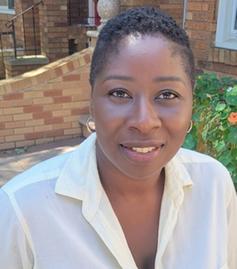
|
|
| Karen Edwards | |
Our updates address the inclusion of technology, specific computer science and technology standards, and coding that are part of today's curriculum. We also expanded the social emotional learning component by increasing opportunities for kids to explore their interactions with each other, and learn to express their emotions, and be part of a community.
Is there anything you, as a Brain Quest kid, were excited to see in the revision?
Zucker: I was really touched and excited by the focus on being a good person for the younger smart cards--there are questions related to being a good neighbor and a good friend, and what it looks like to be a part of the community. Brain Quest isn't just about core academic practice, it's about how to be a person in the world, and a productive person.
What's the most exciting part for you about making books?
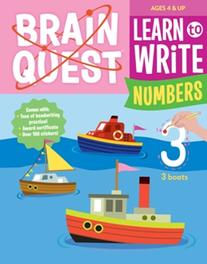 Edwards: It's challenging to present children with content that feels fresh and appealing. Imagine a child has been in school for six to eight hours working on math, English, or science. And then they go home and are told that they have to do more work? Or worse: they are forced to do schoolwork on weekends and over the summer. I'd rebel, too. So, finding a way to connect with a child, to supplement their learning in a way that makes them want to do the work, is highly rewarding.
Edwards: It's challenging to present children with content that feels fresh and appealing. Imagine a child has been in school for six to eight hours working on math, English, or science. And then they go home and are told that they have to do more work? Or worse: they are forced to do schoolwork on weekends and over the summer. I'd rebel, too. So, finding a way to connect with a child, to supplement their learning in a way that makes them want to do the work, is highly rewarding.
Zucker: Yes! We talked about that when we were developing the Learn to Write series. Those were the first books I worked on from idea to completion, and it's been really rewarding to see the response from four- and five-years-olds. It's fun to watch the videos on social media and see the kids happily filling out the workbooks.
Edwards: Right--get them excited about doing the work. Reward them! I mean, is there anything more mundane than handwriting practice? I've been so impressed with the way that you worked with our design team to make the books visually exciting, with varied opportunities for practice. And the emphasis on celebrating the child throughout--that focus on the user experience shows such respect for the child.
Zucker: And have you noticed that parents are always happy when you give a Brain Quest gift? Teachers, too. I think it's because we make our books with teachers in mind--every Brain Quest book and workbook is written by or edited and vetted by teachers.
We're also thoughtful about approaching the same content in different ways. Let's say you're in kindergarten. You can start with the handwriting practice in Learn to Write, or you can use the Brain Quest smart card deck to play quiz games, and then you have the workbook and Learn by Sticker for fun practice.
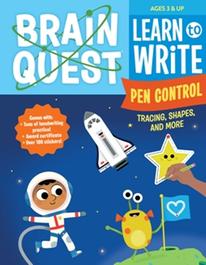 Edwards: Different roads leading to the same destination.
Edwards: Different roads leading to the same destination.
Zucker: That's right. The activities in Learn by Sticker Math are not a repeat of anything that they've seen in a Brain Quest workbook or in the smart cards. They may have learned or practiced the math, but this is a completely different approach to that same concept. It's a robust way to supplement a kid's learning from school without it feeling like "not this again."
Edwards: I think one of the hallmarks of Brain Quest is our distinct approach. The focus is on how we can make this experience feel enjoyable for the child, how we can make it valuable for a teacher or parent. There's that temptation to cram as many exercises as possible on a page to give them that opportunity to practice; and the challenge is to find that balance--the right amount of practice while still making the page feel welcoming.
So, what's the most exciting part for you about making a book?
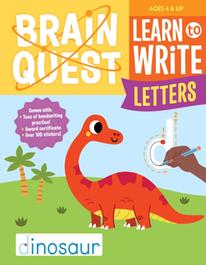 Zucker: There are so many exciting parts. It's such a creative job. Not only do we figure out what goes on the page, but we think about who the illustrator should be, what the visual themes are going to be, and then we also talk to marketing and pitch ideas to them.
Zucker: There are so many exciting parts. It's such a creative job. Not only do we figure out what goes on the page, but we think about who the illustrator should be, what the visual themes are going to be, and then we also talk to marketing and pitch ideas to them.
I told you this, I think--I was at a coffee shop in Toronto, Canada, and a child was doing Learn by Sticker, and I went over and introduced myself to the mom. And I was like, "I know this is weird. I made this book!" She gushed and wanted to know when the next one was coming out--it was just amazing.
Edwards: That's so rewarding!
Zucker: It was really exciting to know that this kid was engaged and had fun--and it was also good math practice for him.
Edwards: It's great to see our mission come to life: to make learning fun; to make learning accessible; to make kids feel seen and valued.

